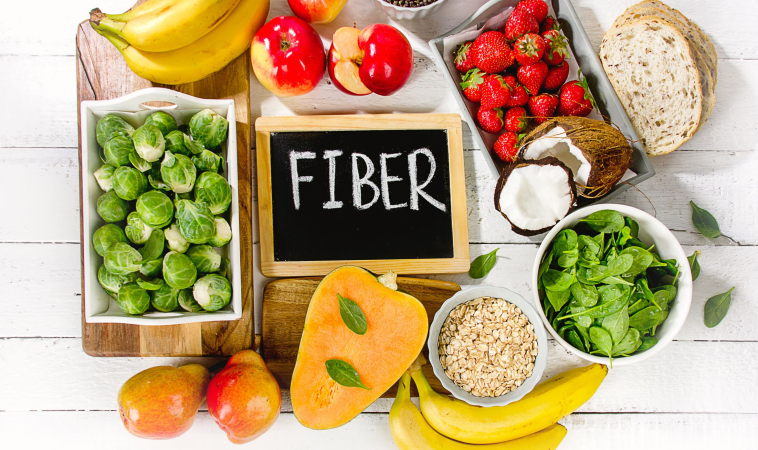Many popular diets may be diminishing the amount of fiber that is consumed on a daily basis. Diets like the ketogenic diet or Atkins diet, which concentrate on fats and proteins often limit foods that are high in dietary fiber, such as whole grains and legumes.
“Good carbs” & “bad carbs” and how different diets impact the body
Just as there are “good fats” and “bad fats,” there are “good carbs” and “bad carbs,” which are drastically different in their sugar content as well as fiber content. Foods with higher fiber content, such as whole grains, legumes and vegetables, are vitally important to include in the diet for many reasons, such as lowering cancer risk, improving blood sugar regulation, as well as improving digestion.
Increasing fiber intake can decrease risk of cardiovascular disease and chronic disease
Studies have shown that increasing fiber intake can decrease the risk of cardiovascular disease as well as chronic disease. For instance, one study showed a 15-30 percent decrease in cardiac deaths, stroke, type-2 diabetes and colorectal cancer in people who consumed a higher-fiber diet.
So, avoiding carbohydrates can remove valuable sources of fiber from the diet. Legumes and whole grains are great ways to increase dietary fiber, of which many Americans are severely deficient in their daily intake. Recommendations for fiber intake range from 30-40 grams daily, and most Americans consume about half of that (15-20 grams).
Fiber is inexpensive
Fibrous foods are very inexpensive. Legumes, such as lentils and chickpeas, rice, oatmeal, and other whole grains are very affordable. It takes time and effort to cook these things, but these are the foods that most of the world eats (because they can’t afford the processed foods that the Western world has become so accustomed to calling ‘food’).
Fiber and Cancer
It is very well accepted that higher fiber diets are correlated with lower rates of several diseases of the colon, including colorectal cancer.
Fiber speeds up excretion time, which makes getting rid of toxic metabolic waste products more efficient, so these things aren’t sitting in the digestive tract and becoming reabsorbed into circulation.
Fiber feeds the microbiota
Additionally, fiber feeds the microbiota, which produces healthy metabolites, such as butyrate, which has been associated with cancer prevention in other areas of the body as well.
Colon cancer
Colon cancer is a relatively unknown occurrence in rural African culture, where individuals consume a high-fiber diet (more than 50 grams daily). Compared to African American populations who consume a relatively low-fiber diet.
Changes in microbiome occurred within 2 weeks
A study was conducted that swapped the diet of rural Africans (high-fiber, low-fat) with African Americans (low-fiber, high-fat) for two weeks. Even though the diet change only lasted two weeks, both groups experienced changes in microbiome as well as the metabolites produced in the gastrointestinal tract. Several biomarkers associated with cancer were seen to develop in the low-fiber group.
Eat more vegetables, whole foods, and less processed products
It is unknown whether synthetic fibers offer the same benefits, and some of the effects seen with increased fiber intake may have to do with other nutrients contained within whole foods containing fiber. Thus, this is further support for the advice to eat more vegetables, whole foods, and less refined and processed products.
Source:
- Rubin R. (2019). High-Fiber Diet Might Protect Against Range of Conditions. JAMA. doi:10.1001/jama.2019.2539.
 Razi Berry is the founder and publisher of the journal Naturopathic Doctor News & Review, which has been in print since 2005, and the premier consumer-faced website of naturopathic medicine, NaturalPath. She is the host of The Natural Cancer Prevention Summit and The Heart Revolution-Heal, Empower and Follow Your Heart, and the popular 10 week Sugar Free Summer program. From a near death experience as a young girl that healed her failing heart, to later overcoming infertility and Chronic Fatigue Syndrome and Fibromyalgia through naturopathic medicine, Razi has lived the mind/body healing paradigm. Her projects uniquely capture the tradition and philosophy of naturopathy: The healing power of nature, the vital life force in every living thing and the undeniable role that science and mind/body medicine have in creating health and overcoming dis-ease. Follow Razi on Facebook at Razi Berry and join us at Love is Medicine to explore the convergence of love and health.
Razi Berry is the founder and publisher of the journal Naturopathic Doctor News & Review, which has been in print since 2005, and the premier consumer-faced website of naturopathic medicine, NaturalPath. She is the host of The Natural Cancer Prevention Summit and The Heart Revolution-Heal, Empower and Follow Your Heart, and the popular 10 week Sugar Free Summer program. From a near death experience as a young girl that healed her failing heart, to later overcoming infertility and Chronic Fatigue Syndrome and Fibromyalgia through naturopathic medicine, Razi has lived the mind/body healing paradigm. Her projects uniquely capture the tradition and philosophy of naturopathy: The healing power of nature, the vital life force in every living thing and the undeniable role that science and mind/body medicine have in creating health and overcoming dis-ease. Follow Razi on Facebook at Razi Berry and join us at Love is Medicine to explore the convergence of love and health.

















